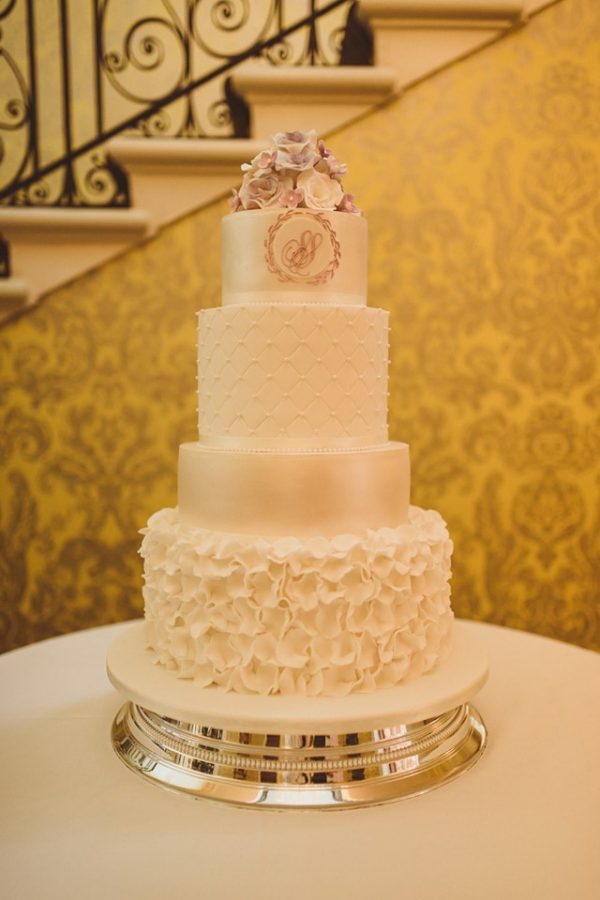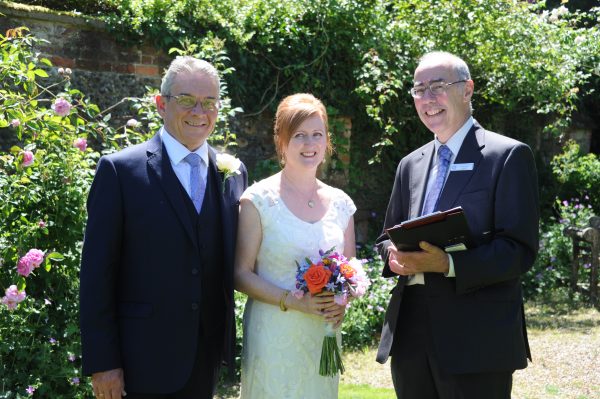
by Michael | Nov 25, 2019 | Blog
A wedding clearly takes a lot of planning and thought. When I got married, we managed to infuriate my aunt by altogether forgetting to invite her. She just got overlooked (no malice intended) and was justifiably miffed when she found out.
The guest
list is not the only way to annoy your guests. Here are just seven other ways:
- When you send the invitations out, be as unclear as possible. Don’t spell out who exactly you are inviting (is plus one invited, or are the children?). Explain that there are various stages of the ceremony, but don’t actually specify what happens when, or who is invited to what.
- If you are holding your ceremony outdoors, ensure there is minimal, or no, shelter from the elements. People love sunburn almost as much as being soaked or frozen.
- Invite your guests to keep their phones on and to take photos throughout the ceremony, even if you are paying a photographer to do the job. The more guests that can block other people’s view by holding their phone in the air, the better.
- Have no thought for the audibility of the event. Nobody actually wants to hear what the celebrant – or couple – are saying, do they?
- Ensure there is plenty of “dead” time between the ceremony and, say, the canapes. The couple may go off and sign a certificate or have photos taken, but don’t let the guests know. It’s even more effective if nobody can tell anybody what’s meant to be happening. Oh, you get bonus points if guests are hungry and thirsty, but have no idea when the refreshments are served.
- The seating plan is a wonderful way to get even with people. You can “innocently” seat someone with their ex, or place enemies next to each other. Very rewarding.
- When presenting a speech, cramming it with in-jokes, preferably, about one side of the family only, is very satisfying and can exclude surprisingly large swathes of your guests.
Please don’t
feel that this list is comprehensive. There are other ploys you can use very
successfully. Perhaps you can think of a few?
I’d better point out that this list is delivered tongue-in-cheek! Should you choose to honour, entertain and please your guests, of course these are what you should strive to avoid.
If you want to chat about a dream, rather than a nightmare, ceremony, then please get in touch with me.
Photo: courtesy Matt Penberthy

by Michael | Nov 19, 2019 | Blog
Wedding planning
is a very delicate balancing act. First and foremost, bride and groom must see
eye-to-eye. Secondly, other people may well be involved, and their feelings and
opinions may not correspond to the couple’s.
Bride and Groom
Usually – and I know this is a terrible stereotype! – the groom doesn’t pay much attention to the organisational details of the wedding. I know some do play their part wonderfully. However, the majority, in my experience, would like no more than some kind of idea what the bride is planning. Just to rubber-stamp it.
Even in these circumstances, bride and groom need to co-operate to some extent. The groom may not be bothered about the menu (although that’s something he might well take an interest in), but may care passionately about the guest list. They need to discuss this (amicably). They should both agree on the venue and officiant.
So my best advice here is to play an open game. By that I mean that the groom should be able to participate in the planning, if he likes. The bride should offer to let him know what she is planning (but spare him the bridesmaids’ dresses, I’d say!).
Wedding Party
Of course,
others are involved too, whether as bridesmaid, flower-girl, usher, Best Man,
parent, and so on. How much notice should be paid to their views?
The bottom line is that the wedding is the couple’s affair, so whatever they want ought carry the day. Even if someone else is bankrolling the affair, it is still the couple’s big day.
However, if they are expecting others to contribute (whether financially or as an active participant), there may need to be some give and take. Nobody should be forced to go against their wishes or take on a role they don’t relish at all.
Compromise is the order of the day. Maybe somebody who might otherwise be overlooked could read a poem, say. Perhaps a moody youngster can be encouraged to look after the wedding presents. Possibly, a bridesmaid, sulky about the dress she is forced to wear, can be given a bunch of flowers.
Ordinarily, the families are willing – and able – to reach a balance, and a wonderful day is had by all.
If you have any thoughts or questions arising from this, feel free to contact me.

by Michael | Nov 11, 2019 | Blog
People sometimes think the civil celebrant cost for a ceremony is not justified. Uncle John can do that just as well – and for free!
But will Uncle John be able to put together – let alone present – a ceremony that is memorable (for the right reasons)? Does he have the writing and presentation skills, for example?
A lot of people think that all a civil celebrant has to do is to rock up at the ‘gig’ and deliver a few well-chosen words and then go home. Money for old rope, as they say.
However, it’s actually a lot more than that for me.
The ideal
My mission
is to cultivate a relationship between myself and the client. I want them to
trust me and feel there’s rapport. That’s especially important if I’m going to
be conducting their ceremony on the most important day of their lives!
I make it my goal when we meet to ask the right questions and actually listen to the responses. Then I can understand the clients’ vision and be in a position to help them realise it.
I compile a ceremony that reflects their personalities and beliefs and which is everything they want.
I take pride
in conducting an impeccable ceremony.
Finally, I appreciate that I am privileged to be part of the couple’s excitement and joy.
How do I achieve that?
Firstly,
cultivating a close relationship takes time, as well as patience and tact. (I
do not end up working with every person who enquires about my services.)
I don’t
assume I know the clients’ wishes better than they do. I will advise them, if I
feel, from my considerable experience, that something might, or might not,
work; however, it is their big day, and I never forget that.
I am happy
to give advice, if the clients are unsure what to do. The goal is to draw up a unique,
personalised ceremony that fulfils the clients’ dreams.
Either way,
we normally exchange drafts until the clients are happy with every word.
I always bear in mind that it’s not about me, but the clients. I present clearly and beautifully. I won’t accept second best.
The bottom line
I trained
both as a funeral celebrant and as a celebratory celebrant, and that training
was not cheap.
I have considerable experience – I graduated as a celebrant in late 2012 and have now conducted over 150 ceremonies (including weddings (same-sex and heterosexual), vow renewals, handfastings, namings and funerals). It’s difficult to put a price on such experience.
My many
testimonials demonstrate that I am professional but friendly, and focussed on achieving
my clients’ goals.
On the day,
I will normally arrive an hour early. I check everything is in place at the
venue and reassure the groom! I am a calming influence at a frenetic time.
When I
conduct the ceremony, I use my considerable presentation skills. I foster a
warm atmosphere and make the guests feel included too. Such skills come at a
price.
All this is why I charge a fee. if you try me, I hope you’ll agree that I do earn it!

by Michael | Nov 4, 2019 | Blog
It can be exciting and fun to organise something a bit special when a major celebration like a big birthday or anniversary comes along. A party is one thing, or a night away or even a meal out for two, but could you do more?
Surprise!
Organising
an event will obviously involve guile and labour, especially if you want it to
be a surprise.
I recently attended a lunch at le Manoir aux Quat’ Saisons, where about 30 of us had been invited to celebrate Juliet’s 60th birthday.
Not as complex as all that, surely?
We had been invited by letter – and sworn to secrecy – over one year previously, by Juliet’s husband. He had set up a special e-mail address only for the replies. He had had to communicate with the venue only whenever he knew Juliet was out of the house.
For that weekend he found a pretext to get her to Oxfordshire without her suspecting what was afoot.
It all worked out, but, to say the least, was less than straightforward. (Not least when one guest accepted, cancelled and then later decided they would come after all! Or when we got stuck (fog-bound) on Guernsey the night before and looked like missing the event. Remarkably, we made it but that’s another story!)
Alternatives
Organising a celebration in a local restaurant for a dozen or so family members or friends should be simple and often lovely.
How about
making it a bit more special?
What about adding to it by having a celebrant prepare and deliver a short speech – perhaps about the life of the person being honoured?
Could you
hold a ceremony at home?
Then you might hold a short ceremony incorporating our star’s story and input from a few friends and/or relatives.
Some ritual could be included (such as lighting a Unity Candle or presenting the star with a red rose). Close family members might participate in the ritual.
A few people
might be invited to say a few words in honour of the star.
The whole to be facilitated by a civil celebrant, of course!
Whether or
not you choose to organise such an event secretly or openly, the hero will
surely be grateful for the efforts put in. Chances are, he/she will appreciate
being the centre of attention for a while.
So why not give this suggestion some thought? And who better to have a chat with than Michael?!

by Michael | Oct 21, 2019 | Blog
Yum! You’ll
be licking your lips at the prospect of this blog, after reading the title!
Well, I’ll
try and keep it light, but it’s an important area.
As far as legal registration is concerned, we’re only talking about births, deaths and weddings. You don’t need any paperwork to celebrate a Vow Renewal or handfasting.
With births,
the registration is almost always done at the hospital (although I realise that
not everybody has their baby there). For deaths, the doctor (either at home or,
again, at the hospital) usually provides the death certificate, and you take it
to the local Register Office.
With
weddings it’s a little more complex.
Religious weddings
If the wedding is conducted in an Anglican church or synagogue, or according to the Quaker service, then there is normally a member of the church (etc.) present who is a registrar. They will ensure the legalities are carried out.
If you’re
having a marriage anywhere else, then things are different. That’s where it
gets more complicated!
Register Office
You need to register your intention to marry at least 28 days in advance. Then you go to the Register Office (by appointment) with two witnesses, and can get legally married. The ceremony will be totally secular and fairly standardised (so next-to-nothing to differentiate one service from the next).
You don’t necessarily have to go to the Register Office. Legislation is going to change, but for now, provided the wedding venue has four solid walls and a roof (basically), the registrars can come out to the venue and conduct the wedding for you there. (This will cost several hundred pounds more than attending the Register Office.)
Another alternative
You can have a civil celebrant-led ceremony. This may allow you a religious (or partially-religious) or a secular ceremony – but the choice is ultimately yours. The big thing – setting this option out from the other two – is that you can have the ceremony of your dreams. Why? Because the celebrant should work with you in advance to respect and enable your vision. It’s all about personalising, rather than following a standard rubric. That means your ceremony will be unique, and can reflect your personalities and beliefs.
The downside
is that (again, there is new legislation in the air for England & Wales)
currently a civil celebrant’s ceremony has no legal validity. So you still have
to have the Registrar-led ceremony (either in their office or at your chosen
venue, if it’s suitable) in addition.
Either way,
once you’re legally married, you can have the dream ceremony, conducted by the
celebrant, afterwards. To all intents and purposes, that will be your real
wedding!
Hopefully, not so painful, was it? But if you have any questions, please feel free to ask me.
Photo: Matt Penberthy




